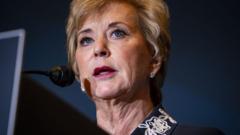Scotland’s Finance Secretary Shona Robison faces significant challenges as she prepares to draft the upcoming budget for 2025/26. Multiple sectors are calling for comprehensive reforms and increased funding, putting immense pressure on the Scottish government’s financial planning.
The UK government indicates an extra £3.4bn is available for the budget, primarily through the block grant system established in the 1970s. However, much of this additional funding has already been absorbed by public sector salary increases. The Fraser of Allander Institute notes that Robison will have limited financial flexibility.
Key pressures include:
– NHS sustainability: Audit Scotland warns the healthcare system is unsustainable
– Local authority funding demands
– Education sector challenges, including teacher shortages
– Potential council tax reforms
– Business rate relief requests
Robison aims to focus the budget on eradicating child poverty, addressing climate change, improving public services, and growing the economy. Her budget will require support from parties outside the SNP minority administration to become law.
The Scottish government has expanded its powers since devolution in 1999, particularly in welfare and taxation. Devolved social security spending has dramatically increased from £192m in 2018/19 to £5.1bn in 2023/24. A notable policy is the Scottish Child Payment, a weekly benefit for low-income families.
Tax policies have also diverged from the rest of the UK, with those earning over £29,000 paying more income tax in Scotland compared to England. The current tax system is more complex than in other UK regions.
The SNP has maintained various state-funded benefits over its 17-year governance, including:
– Personal care for the elderly
– University tuition
– Free prescriptions
– Free bus travel for youngest and oldest citizens
However, some critics argue these broad benefits might not be the most effective use of limited resources. Alison Payne from Reform Scotland suggests more targeted support might be more beneficial.
The NHS remains the most significant budgetary challenge, consuming 40% of the budget and facing sustainability issues. Audit Scotland has highlighted ongoing performance problems and a worsening financial position.
Political parties have diverse expectations for the budget:
– Scottish Labour criticizes SNP management
– Scottish Conservatives argue people are paying more and receiving less
– Scottish Liberal Democrats demand convincing proposals
– Scottish Greens seek climate and poverty-focused investments
– Alba Party wants preservation of existing social contracts
John Swinney, Robison’s boss, has promised to guide Scotland from a “long, dark winter” to the “warmth of spring,” emphasizing the critical nature of this budget in addressing multiple societal challenges.
The budget will be scrutinized in the Scottish Parliament over winter, with a final vote expected in February, making it a crucial moment for Scotland’s financial and social policy direction.



